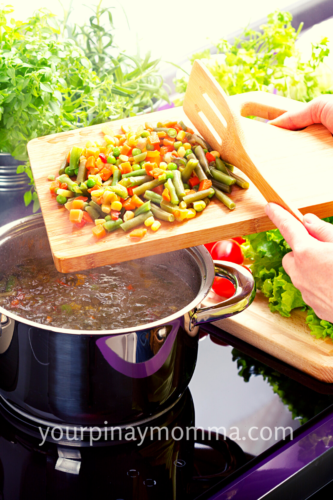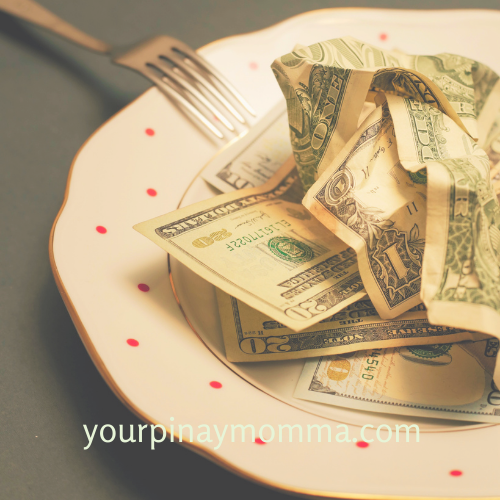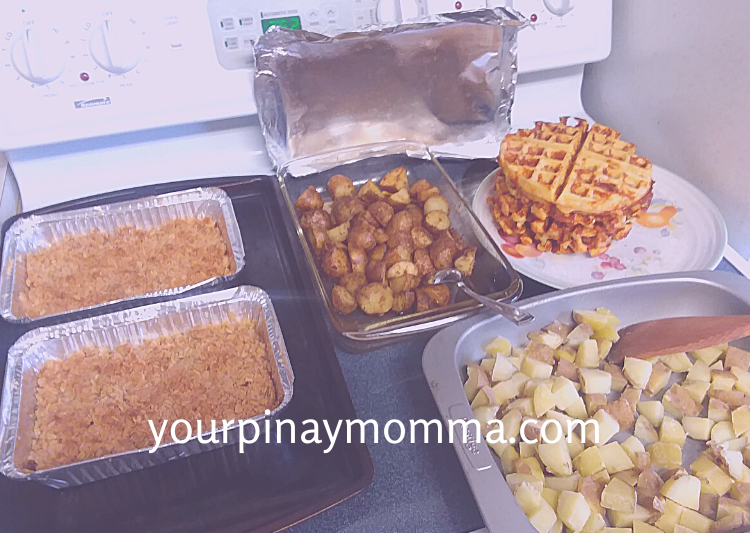
Last updated on January 22nd, 2023 at 02:10 pm
Budgeting on food can be as daunting as any other task. This gets extra tricky when you have to consider the specific needs of your family, and how much money you can spend.
Each family is different, and there are a lot of things you need to look at and adjust with to come up with a foolproof way to stick to your meal plans.
I want to share some things I’ve learned over the years and how I got consistent with them.
* note: By clicking the links on this page, I might get a small commission at no extra cost to you. 🙂
Determine your actual spending average
Just like any other expense like utility bills and monthly subscriptions, you can also start setting a budget for the food you spend. I practice Jordan Page’s rule of $100 per month, per person, starting at $300 a month. By listing down your food purchase, you will get an idea of how much you actually spend. You can then determine how much you can start your budget with.

The pandemic helped us get more conscious of what we buy, how we spend, and where most of the money goes, which eventually lead us to adjust even more. There are months that I go a little over budget, sometimes under, but knowing your limits definitely makes a difference.
Know thy staples
This is important because you wouldn’t want to buy something you will not eat regularly. Wasted food is wasted money.
List down a basic breakfast, lunch, and dinner your family is willing to have for any given day. From there you’ll have an idea of what should be stocked up in your kitchen. Include your snacks and drinks too.

Start writing down your standard breakfasts and lunches for the week, but get a little flexible on dinner. Also, consider what you already have on hand first, before setting up the grocery list for the week. Switch things up every week or so for some variety.
Only consider an item when you’re low on it, out of it, or scheduled to try it.
Stick to your list!
It’s not just having “The List”. The challenge is sticking to it.
Have your list handy before you go to the store. I keep mine in the notes section of my phone. Having a paper list is good too, although there are more chances of forgetting them and end up winging the shop when you’re already at the store.
You should also try to avoid anything else that is not part of the list. That impulse buys even for small amounts will only add up and cause you to go over budget.
We’re all guilty of this at some point, and it might be a struggle at first. But it’s definitely doable.

Shopping On Sale / in Bulk
It’s a standard sales strategy to get the best of us, making us buy more stuff than we intend to.
So before you get too excited about a marked down item, consider asking yourself these questions:
- Is this really a good deal? (Check and compare prices first)
- Are we going to eat/use this?
- How long can I keep this before it goes bad?
- Do I have the space to store it?
- How am I going to use this up?
These will help you decide if it’s worth the money, and also your time.
Snack attack!
Let’s be real, we all have our cravings. And if go unchecked or unplanned, it puts a dent in the budget, too.
I’m not recommending scratching off the snacks altogether (I mean, who can go without?) Go back to your food staples list and include the snacks your family would normally eat. Set a moderate amount to purchase for the week.
If you have time to spare, consider making some things at home. If it’s cookies, brownies, or even chips, homemade treats can help you save some decent dollars.
This is also a chance to look at healthier options especially if you have school-aged children. Have them “vote” for a fruit, a vegetable, and a treat.
Last time, Vince “voted” for grapes. We also splurged on ice cream with waffle cones. It was on sale and we enjoyed it at a fraction of the cost compared to going to an ice cream shop.
Plant your own!

If you’re curious about gardening and planting your own food, now is a perfect time! Like food staples, start small and think of the things your family eats on a regular basis, or something that you know will store for longer. Check also the planting season (depending on where you’re at) and the time you’re willing to spend working on your garden.
It will be a huge task at first, but once you’re set with the plant/s you wanted to grow and prepared the ground, the rest will get easier. And what can be more rewarding than growing your own food?
Prep and Execute.
You can do this in various ways. A few examples would be:
- Cutting up your fruits and vegetables.
- Get the snacks ready for school the night before
- Browning your meats (ground beef or the like) and portioning them before putting them in the freezer
- Cook and portion food for lunches
- Filling up the water bottles the night before
- Make a batch of desserts to be eaten for the week

It doesn’t need to happen all on the same day, because that can be overwhelming.
When I moved to the U.S. and had my first job, I started with mere lunch sandwiches for me and my husband. As the busy day goes by, it saves us time to think of what to eat and saves us money knowing that we have a ready meal on hand.
Other options available
If you’re still in a pinch considering all these, maybe you can get some help from your community.
If you’re in the U.S., check your city, school, or church. More than often they will have some information on how to get in touch with a pantry or a food bank. There are plenty of organizations that provide resources on how to get free or discounted food.
When Covid hit, I stopped working for safety reasons. While at home, I started looking for these options and went out of curiosity to the one closest to my area. It was a pleasant surprise. They have fruits and vegetables from local farms, dairy, and even meat. It helped immensely to cut back on our food budget and divert our funds to other expenses.
I hope these tips help you jumpstart your way to controlling your food spending and managing the rest of your budget in the long run.

One thought on “How To Start Budgeting on Food”